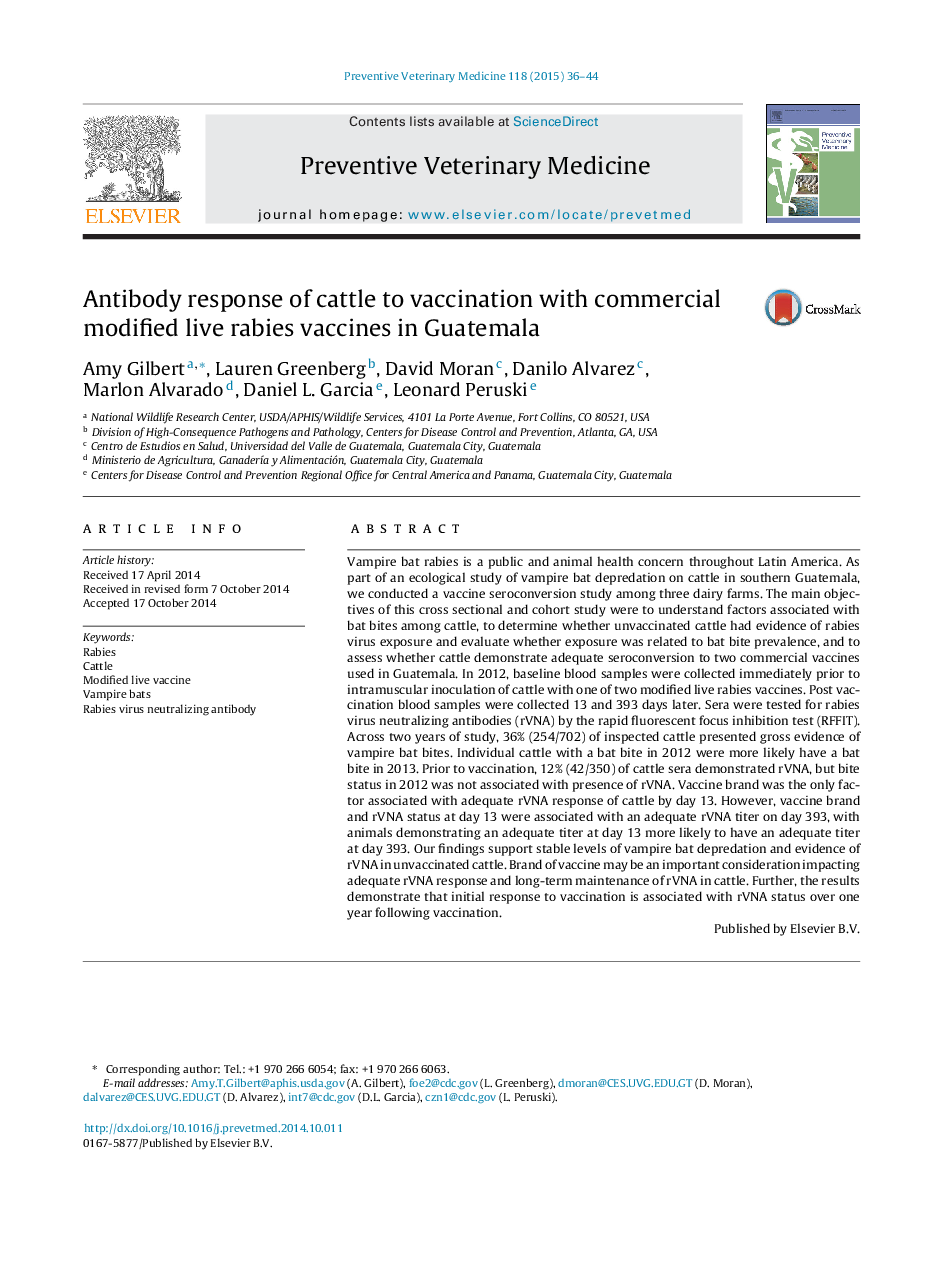| کد مقاله | کد نشریه | سال انتشار | مقاله انگلیسی | نسخه تمام متن |
|---|---|---|---|---|
| 5793350 | 1110011 | 2015 | 9 صفحه PDF | دانلود رایگان |
عنوان انگلیسی مقاله ISI
Antibody response of cattle to vaccination with commercial modified live rabies vaccines in Guatemala
ترجمه فارسی عنوان
واکنش آنتی بادی گاو به واکسیناسیون با واکسن های تجاری زنده اصطلاحا هاری در گواتمالا
دانلود مقاله + سفارش ترجمه
دانلود مقاله ISI انگلیسی
رایگان برای ایرانیان
کلمات کلیدی
بی خوابی، گاو، واکسن زنده اصلاح شده خفاش خون آشام، ویروس آنتی بادی ضد ویروسی،
موضوعات مرتبط
علوم زیستی و بیوفناوری
علوم کشاورزی و بیولوژیک
علوم دامی و جانورشناسی
چکیده انگلیسی
Vampire bat rabies is a public and animal health concern throughout Latin America. As part of an ecological study of vampire bat depredation on cattle in southern Guatemala, we conducted a vaccine seroconversion study among three dairy farms. The main objectives of this cross sectional and cohort study were to understand factors associated with bat bites among cattle, to determine whether unvaccinated cattle had evidence of rabies virus exposure and evaluate whether exposure was related to bat bite prevalence, and to assess whether cattle demonstrate adequate seroconversion to two commercial vaccines used in Guatemala. In 2012, baseline blood samples were collected immediately prior to intramuscular inoculation of cattle with one of two modified live rabies vaccines. Post vaccination blood samples were collected 13 and 393 days later. Sera were tested for rabies virus neutralizing antibodies (rVNA) by the rapid fluorescent focus inhibition test (RFFIT). Across two years of study, 36% (254/702) of inspected cattle presented gross evidence of vampire bat bites. Individual cattle with a bat bite in 2012 were more likely have a bat bite in 2013. Prior to vaccination, 12% (42/350) of cattle sera demonstrated rVNA, but bite status in 2012 was not associated with presence of rVNA. Vaccine brand was the only factor associated with adequate rVNA response of cattle by day 13. However, vaccine brand and rVNA status at day 13 were associated with an adequate rVNA titer on day 393, with animals demonstrating an adequate titer at day 13 more likely to have an adequate titer at day 393. Our findings support stable levels of vampire bat depredation and evidence of rVNA in unvaccinated cattle. Brand of vaccine may be an important consideration impacting adequate rVNA response and long-term maintenance of rVNA in cattle. Further, the results demonstrate that initial response to vaccination is associated with rVNA status over one year following vaccination.
ناشر
Database: Elsevier - ScienceDirect (ساینس دایرکت)
Journal: Preventive Veterinary Medicine - Volume 118, Issue 1, 1 January 2015, Pages 36-44
Journal: Preventive Veterinary Medicine - Volume 118, Issue 1, 1 January 2015, Pages 36-44
نویسندگان
Amy Gilbert, Lauren Greenberg, David Moran, Danilo Alvarez, Marlon Alvarado, Daniel L. Garcia, Leonard Peruski,
